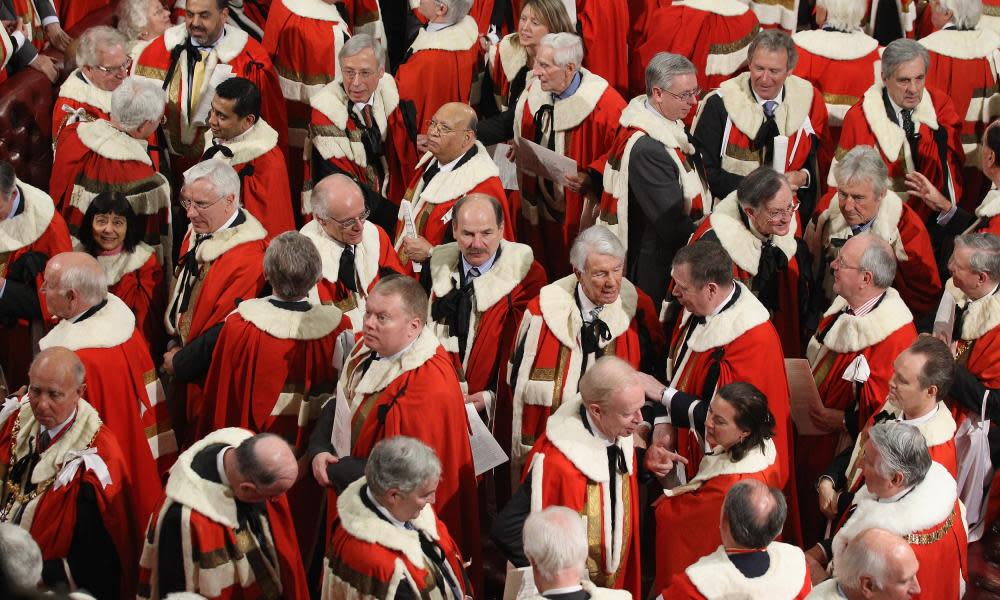May vows to end automatic peerage for senior public roles

Theresa May has said she will end “automatic entitlement to a peerage” for holders of high office in public life such as senior figures from the judiciary, police, military and civil service.
The prime minister also urged peers to “embrace retirement” at the appropriate time, as she promised to oversee “continued restraint” when making new appointments.
May made the promise in a response to the Burns report, which recommended reducing the House of Lords from almost 800 members to 600.
In a letter to Norman Fowler, the Lord Speaker, May said: “Peers on the Conservative benches have a strong record in embracing retirement at the appropriate time, but achieving the sort of change outlined by Lord Burns and the committee will require that peers from all sides of the House to do the same.”
Fowler welcomed the prime minister’s letter and “recognition of the careful and considered work done by Lord Burns and his committee”. He said the crucial part of the letter was the promise of further restraint and no automatic entitlements. “This is the first time such a statement of this kind has been made by any prime minister,” he said, arguing the statement of intent challenged the House to reduce numbers. “The ability to reduce the size of the House is now within our own control. I intend to work with the political leaders in the House to agree how best to take this forward.”
But a Labour spokesman said the Lords reform was another example of the Tory government putting things off to some uncertain time in the future. “As well as ending the hereditary principle for good we ultimately want to see an elected second chamber, but Theresa May has ducked giving a proper response.” Jeremy Corbyn has only appointed one Labour peer since May become prime minister.
The Labour MP Chris Bryant claimed the situation was unsustainable. “Yet again there is a nettle that needs to be grasped and the prime minister is running around looking for dock leaves. She seems temperamentally unable to make a decision,” he said.
May pointed out in her letter that while her predecessor, David Cameron, had placed 13 Tories in the Lords through his controversial resignation honours list, she had opted for just three ministerial appointments. May also recommended that distinguished public servants – the lord chief justice, the former bishop of London, the former Met police commissioner, former chief of the defence staff and former private secretary to the Queen – became crossbench peers.
Their appointments came as 23 peers decided to retire following the Lords Reform Act; and two peers were removed for non attendance, while 16 died.
Overall, May said, there had been a net reduction of 20 members since she had become prime minister. “I am keen to maintain that trajectory,” she said. However, at that rate it would take almost 15 years before the Lords was reduced to the numbers recommended by the Burns report.
May is also planning to put forward a list of political appointments imminently, which could include former cabinet ministers such as Eric Pickles and Peter Lilley.
She is likely to face accusations of kicking some of the Burns recommendations into the long grass. In her letter she wrote that the report had divided its recommendations into two key areas – steps to reduce the size of the Lords and establishment of mechanisms to maintain it at a “steady and smaller state”.
For the second aim, May said that further, careful, thought by the Commons was required before any action; however, it should not preclude “taking actions now”.
The idea of automatic entitlement for some very senior public roles is not a legal mechanism but a convention arising from figures entering the Lords on their own account. Sources made clear that automatic entitlement would cease in the case of judges, police officers and civil servants, but said that bishops were a distinct case and had a separate process.
Former cabinet ministers have also tended to move into the upper chamber, although that has not always been the case; Jack Straw, who was cleared of breaching rules, concerning cash-for-access allegations, was not nominated for a peerage in 2016.

 Yahoo News
Yahoo News 
